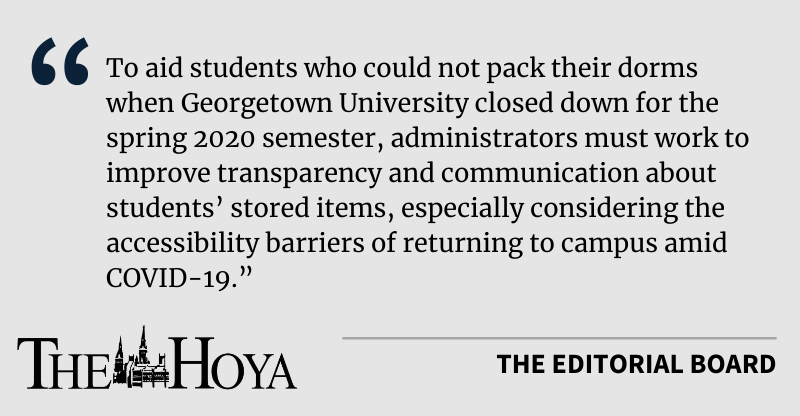When Lauren Olosky (SFS ’21) returned to campus in June after Georgetown University packed her belongings following the outbreak of COVID-19, she found several personal items missing, such as original artwork. No one should be put through the emotional burden of losing personal items on top of dealing with a pandemic, especially considering the barriers that might have prevented them from returning for their belongings in the first place.
To aid students who could not pack their dorms when Georgetown closed down for the spring 2020 semester, administrators must work to improve transparency and communication about students’ stored items, especially considering the accessibility barriers of returning to campus amid COVID-19.
As we enter the second half of the fall semester, students may consider moving back to Washington, D.C., over winter break or retrieving their items from storage. On March 13, Provost Robert Groves sent an email to the student body asking students to move out of their housing by March 29. Groves also assured students that, if they could not return, Georgetown would not dispose of student’s belongings.
While we understand that Georgetown had to work with Hilldrup in a very limited timeframe during a time of great uncertainty, Georgetown could have worked around this problem by extending the time it took to pack rooms. While this adjustment may pose a contamination risk, extra time would have allowed for more careful social distancing and health measures among volunteers and Hilldrup employees. Furthermore, because very few students were permitted to live on campus after March, many dorm rooms could have remained as students left them long past the end of March.
Roughly 550 students could not return to campus by March 29 and needed their personal items packed and stored, according to a university spokesperson. Georgetown worked with Hilldrup, a local moving and storage service, to execute student storage. Georgetown staff even asked students about items with sentimental value so staff could pay them special care. While Georgetown officials must treat all belongings with care, officials say they paid extra attention to particularly sentimental items.
Though the university said they worked with Hilldrup to ensure the safe storage of students’ belongings, student stories do not reflect such caution. In late September, The Hoya reported on two students who had trouble locating their items. One student requested Georgetown ship certain important items to them, only to find many items missing. When the student requested a refund, Georgetown’s Office of Risk Management did not deliver the full amount.
It is unacceptable that Georgetown and Hilldrup lost students’ items after assuring their safekeeping. Understandably, students who have not been able to return to campus since March are wary that their belongings may be lost, too. Going forward, Georgetown must promise complete transparency about students’ items, including where they are currently stored and exactly how they were packed.
This communication is especially important considering many students may have chosen not to return to campus for health or financial reasons; it is a significant burden to purchase an unplanned plane ticket amid a pandemic, and those students who could not do so should not face a disadvantage.
Stanley Guo (NHS ’22) did not feel safe returning to Georgetown’s campus in March and subsequently requested that Hilldrup store his personal items. However, upon returning to campus in August, Guo found many of his items missing.
“Hilldrup had lost over $1400 worth of my items, including an instrument of mine that I’ve had for over eight years. Granted, the company themselves reimbursed me for the items that they have lost, but I can never get back the items that held a sentimental value for me, I was never getting back– regardless of how much money I had received in reimbursement,” Guo wrote in an email to The Hoya.
Students can never truly replace sentimental or personal items. Georgetown officials must work with Hilldrup to communicate with students who stored their items. Furthermore, Georgetown must work with Hilldrup to answer any and all student inquiries about personal items that are still in storage. If students’ items have been destroyed or lost, they have the right to know the current state of their belongings. The Office of Risk Management must fully compensate students for all missing items.
Students must not be punished for being unable to pack their rooms during the onset of COVID-19, and Georgetown should immediately take steps to improve communication and transparency about student storage.
The Hoya’s editorial board is composed of six students and is chaired by the opinion editor. Editorials reflect only the beliefs of a majority of the board and are not representative of The Hoya or any individual member of the board.









